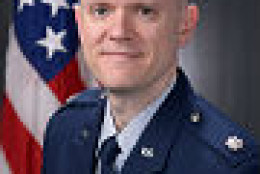Air Force
-
Task Force Cyber Secure will attempt to apply the same degree of rigor and oversight DoD uses for its computing networks to everything else that's vulnerable to cyber threats, including weapons systems and industrial control systems. The Air Force is following in the footsteps of the Navy to ensure cybersecurity is everyone's responsibility.
April 03, 2015 -
The Air Force and Northrop Grumman have a new deal in place. They're calling it a public-private partnership, and it will enable Northrop Grumman to provide the Air Force with sustainment of future weapon systems. Air Force officials say they hope the deal will improve efficiency, both in negotiations and in implementing future projects. Dr. Chris Jones, the president of Northrop Grumman Technical Services, joined Tom Temin on the Federal Drive with more on the partnership and how it works.
April 01, 2015 -
The newest edition of the Virtual Enterprise Service Desk is now active on the desktops of airmen all across the Air Force. Version 2.0 includes capabilities that will make users more self-reliant, which will save the Air Force money. Lt. Col. Mark Reith, commander of the 690th Network Support Squadron, tells In Depth with Francis Rose how airmen will find some new power when they click on the vESD icon on their desktops.
March 27, 2015 -
Lt. Col. Andrea deCamara, chief of the Air Force Legal Operations Agency's Special Victims Counsel Division, said victim empowerment is extremely important. "The conviction is not what we'd like to focus on for the victim; it's empowering the victim to be able to make informed choices," she told Federal News Radio's Agency of the Month radio show.
March 26, 2015 -
Larry Allen, president of Allen Federal Business Partners, joins host Mark Amtower to discuss the top procurement issues in 2015, and how they are impacting contractors. March 23, 2015
March 23, 2015 -
Dr. Mica Endsley, chief scientist of the Air Force, works to combat cyber concerns. "I would prioritize defense of our computer systems to be probably among the highest priorities that we have today," she tells Federal News Radio's Agency of the Month radio show.
March 18, 2015 -
The Air Force owns a huge stockpile of intercontinental ballistic missiles and bombers that are quickly aging in place. It owns two out of three legs of the US nuclear triad; the Navy owns the third. Maj. Gen. Garrett Harencak, assistant chief of staff for strategic deterrence and nuclear integration for the Air Force, tells Federal News Radio's Jason Fornicola how the service is modernizing its two legs of the US nuclear triad.
March 17, 2015 -
The U.S. Air Force will award a contract for a long-range strike bomber this year. That contract could completely change the landscape of the aerospace industry, according to Richard Aboulafia. He's vice president of analysis at the Teal Group Corporation. On In Depth with Francis Rose, he said if there's only one thing to pay attention to in the aerospace industry this year, this contract is it.
March 12, 2015 -
Maj. Gen. Garrett Harencak, the Air Force's Assistant Chief of Staff for Strategic Deterrence and Nuclear Integration, balances work to fulfill President Obama's vision with the need to keep U.S. nuclear capabilities viable. "As long as nuclear weapons exist, we'll maintain a safe, secure and effective stockpile for us and our allies," he tells Federal News Radio's Agency of the Month radio show.
March 12, 2015 -
Trying to predict the future isn't the best way to prepare for future threats. Instead the Defense Department should focus on becoming a master at responding to new and unforeseen challenges. That's according to retired Air Force Lt. Col. Dan Ward, the author of "FIRE: How Fast, Inexpensive, Restrained, and Elegant Methods Ignite Innovation." On In Depth with Francis Rose, he offered ways to speed up DoD's acquisition response time and innovation.
March 11, 2015 -
Military contractor requirements seem simple enough: Get the right material to the right location on time. Some contractors are better at it than others. It's true that you get what you measure, which is why the military branches have the Contractor Performance Assessment Reporting System (CPARS). They use it to create an incentive program to spur on suppliers. Bobby Smart, the Air Force's deputy assistant secretary for Acquisition Integration, joined the Federal Drive with Tom Temin to explain how the system works.
March 11, 2015 -
Air Force Deputy Assistant Secretary for Energy Roberto Guerrero cites new efficiencies, public/private partnerships as keys to reduced energy use.
March 05, 2015 -
Troubled by a lack of women and minorities at the Air Force's higher levels, its leaders are rolling out nine initiatives focusing on recruitment, promotions and retention. "This is not just about how we look. It's about our readiness and capabilities today and in the future," Air Force Secretary Deborah Lee James said.
March 04, 2015 -
Bloomberg Government analysts Robert levinson and Cameron Leuthy join host Roger Waldron to to talk about what's in the fiscal year 2016 defense budget. February 24, 2015
February 24, 2015 -
Larry Allen, president of Allen Federal Business Partners, joins host Mark Amtower to discuss the top procurement issues in 2015, and how they are impacting contractors. February 23, 2015
February 23, 2015










